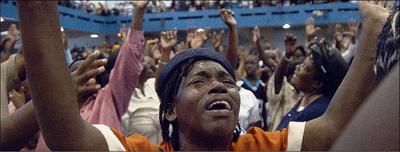Athaliah Reynolds, Staff Reporter

A woman weeps with deep emotion at the 'Heal the Family - Heal the Nation' fasting service at the National Arena last year. It is argued that religious services like these, while satisfactory to women, turn off men. - Rudolph Brown/Chief Photographer
Despite the proliferation of churches in Jamaica, there has been a distinct absence of men in the pews. Visit almost any congregation across the island on any given Saturday or Sunday and you will most certainly find a church packed with women of all ages and socioeconomic backgrounds, amid a dwindling group of men - some too young to defy their mother's rules, others maybe too old to wander elsewhere.
Pastors and church officials fear that the feminisation of services and other church events is driving men away. Furthermore, they suggest the "nuff-gal syndrome" is a strong pull on many men, who know that a sexually promiscuous lifestyle is incompatible with Christianity.
Statistics provided by The Jamaica Baptist Union indicate that between 2004 and 2005, there were approximately 9,084 men in comparison to 23,585 women attending 310 churches in that denomination. For the period 2005 to 2006, there were 10,105 men, compared to 25,148 women, within 308 churches.
Other denominations provided similar statistics. The Seventh-day Adventist Church estimates that the denomination comprises about 75 per cent women, and 25 per cent men - giving a ratio of three women to every man.
Gender difference
Based on the observations of Bishop Everton Thomas of the Jamaica Pentecostal Union, the gender difference in most churches ranges from about 25-40 per cent males, with a corresponding 60-75 per cent females. Bishop Thomas, however, noted that he was unable to speak for all Pentecostal churches and pointed out that the numbers varied within congregations.
The church has been led by men - with them holding most key positions, such as pastors, deacons and elders. However, observers agree that it is the women who dominate the flock.
But how did a religion, founded by a man and his 12 male disciples some 2,000 years ago, become the province of women?
Many have suggested that the Church is devoid of those things that men, generally, are readily attracted to - adventure, risk and challenge - which are said to be discouraged in the Church. Instead, the Church provides a safe, nurturing, stable and predictable environment - ideas on which women thrive.
Pastor Dr. Patrick Allen of the West Indies Union Conference of Seventh-day Adventist Churches says men often have to face the matter of giving up the job for the Sabbath. "It is more difficult for them [men] to find jobs which do not require them to work on Saturdays," he says.
Pastor Allen also proposes that the message of love appeals more to the emotions of women than men - that is, love for Christ.
Take for example, the lyrics to this popular praise-and-worship song:
"Draw me close to you, never let me go/You are my desire, no one else will do/To feel the warmth of your embrace/You're all I want/ you're all I've ever needed ... ".
It has been argued that some men might feel uncomfortable singing such lyrics to a man - even if He is Jesus. According to David Murrow, author of the book Why Men Hate Going To Church: "Today's church culture favours, even expects, participation in intimate, nurturing behaviour such as singing, hand-holding, sitting in circles and sharing feelings. Many men feel uncomfortable in such an environment and choose not to go."
Pastor Murrow, therefore, argues that men are more likely to be present at a football game, watching television, or maybe even just sleeping, than attending a church service on Sunday morning.
Additionally, Pastor Allen said: "It seems that men are more distracted and carried away by attractions of the world, while women focus more on their established goals."
It is also argued that many Jamaican men are more susceptible to the influence of their friends and colleagues than most women. Ministers of religion agree that the Jamaican dancehall culture, perpetuated by the 'nuff-gal syndrome does have an impact on male church attendance. According to Bishop Thomas, "Church services reinforce values of morality that are not consistent with that kind of lifestyle."
However, it is widely agreed that the Church needs to establish more male-oriented activities to attract men. Men's conventions, business initiatives, social programmes, recognition programmes, recommitment ceremonies, men's marches, fraternities, fishing trips and 'man-talk' rap sessions are some of the many proposals put forward by the Church to gain the attention of men.
Church survey
76 per cent of Jamaicans identified with the Church -1998 census.
19 registered denominations across the island - 2001 census.
Source: STATIN
Taken from The Sunday Gleaner, September 16, 2007

